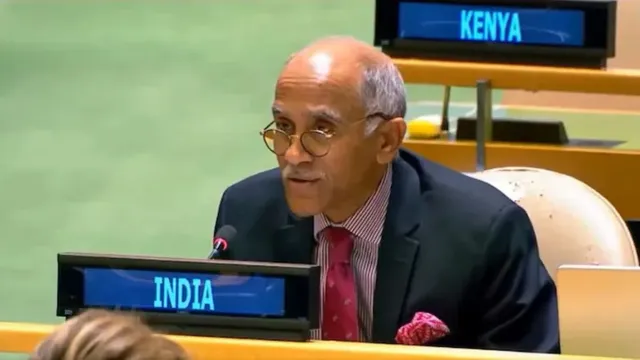- By Supratik Das
- Sat, 24 May 2025 12:32 PM (IST)
- Source:JND
In a significant diplomatic declaration at the United Nations, India justified the move to put on hold the 65-year-old Indus Waters Treaty with Pakistan, citing decades of cross-border terrorism, national security concerns, and energy needs. The decision comes after the Pahalgam terror attack in Jammu and Kashmir that took 26 lives in April. Talking to the UN Security Council, India's Permanent Representative Parvathaneni Harish rejected what he described as "disinformation" from the other side, saying it was Islamabad not New Delhi that has broken the spirit of the 1960 treaty.
"20,000 Indians Killed In Terror Attacks" Says Harish
Harish informed the Security Council that more than 20,000 Indian lives have been lost to Pakistan-sponsored terror in the past four decades. “The Indus Waters Treaty was signed in good faith. But Pakistan, through three wars and thousands of terror attacks, has shattered the spirit of goodwill it was based on,” he said. He pointed out that India has exercised 'extraordinary patience and magnanimity' as Pakistan continued to export terror, threatening the lives of civilians, economic stability, and religious harmony.
Why India Suspended The Indus Treaty?
India formally suspended the World Bank-brokered water-sharing pact on April 23, a day after the Pahalgam attack, blaming Pakistan-backed militants for the deadly strike on tourists in Baisaran Valley. Ambassador Harish outlined four key reasons behind India’s move:
• Pakistan’s Repeated Violations – Including wars, state-sponsored terrorism, and refusal to cooperate on treaty updates.
• Evolving Regional Dynamics – Rising clean energy demands, climate change challenges, and demographic pressure.
• Dam Safety Issues – Pakistan has held back vital modernisations of ageing dam facilities, termed by Harish as "serious safety threats."
• Standstill in Discussion – In spite of repeated invitations to talk about treaty changes, Pakistan continued stalling and refusing India's approach.
"Even in 2012, terrorists ambushed the Tulbul Navigation Project in Jammu and Kashmir. These cynical attempts continue to pose threats to infrastructure and human life," he further stated.
"Pakistan Must End Terror to Resume Talks": India At UN
India made it explicit in the UN that continuation of the treaty hinges on what Pakistan does. "The treaty will be kept on hold until Pakistan– a terror global epicentre, credibly and irreversibly puts an end to its facilitation of cross-border terrorism," said Harish. He re-emphasised that India has never acted irresponsibly as an upper riparian country, devoted to international law and equitable use of water.
Also read: 'To Preach After Such Behaviour Grossly Hypocritical': India Slams Pakistan At UNSC
Following tracking of cross-border connections to the Pahalgam terror attack, India mounted Operation Sindoor on May 7, targeting terror camps in Pakistan and PoK. Pakistan retaliated with missile and drone firings, which were also successfully neutralised by Indian defences. Indian forces again retaliated by targeting Pakistani air bases.The May 10 ceasefire caught the short-lived flare-up in hand, but the suspension of the Indus Waters Treaty continues. The World Bank-brokered Indus Waters Treaty was signed on September 19, 1960, and allocated the rivers of the Indus basin between the two countries. India was granted ownership over the eastern rivers – Ravi, Beas, Sutlej. Whereas, Pakistan was assigned the western rivers – Indus, Jhelum, Chenab. Hailed as a model water-sharing treaty, the pact had endured even during wars
Also read: 'Pakistan Is Like A Jungle': Imran Khan Exposes Nation's Power Game, Mocks Asim Munir's Promotion

